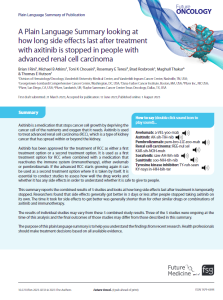Plain Language Summary: looking at how long side effects last after stopping axitinib treatment in people with advanced renal cell carcinoma
 This Plain Language Summary of Publication article in Future Oncology looks at axitinib treatment in people with advanced renal cell carcinoma (RCC). Advanced RCC is a type of kidney cancer that has spread within/beyond the kidney. Axitinib is a medication that has been approved to treat RRC as either a first/second treatment option. This summary describes the results of five studies, in particular looking at how long side effects last after people stopped taking axitinib temporarily.
This Plain Language Summary of Publication article in Future Oncology looks at axitinib treatment in people with advanced renal cell carcinoma (RCC). Advanced RCC is a type of kidney cancer that has spread within/beyond the kidney. Axitinib is a medication that has been approved to treat RRC as either a first/second treatment option. This summary describes the results of five studies, in particular looking at how long side effects last after people stopped taking axitinib temporarily.
You can read the full plain language article here.
The original article on which this summary is based on is called ‘Time to Resolution of Axitinib-Related Adverse Events After Treatment Interruption in Patients With Advanced Renal Cell Carcinoma’ and was published in Clinical Genitourinary Cancer.
Read the original article here.
